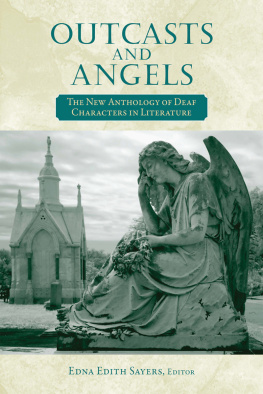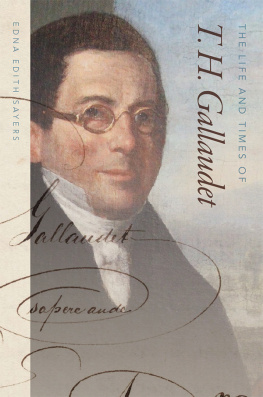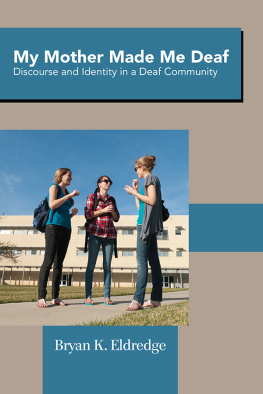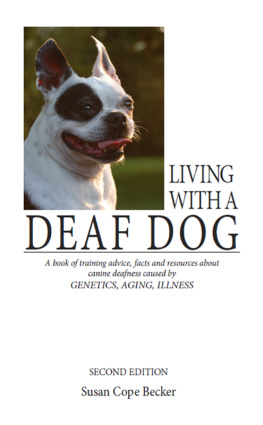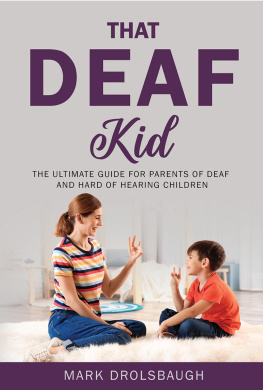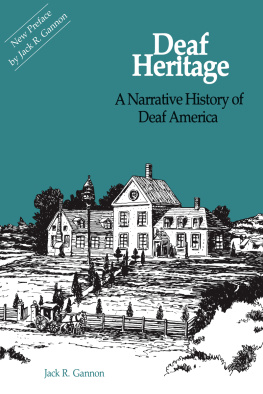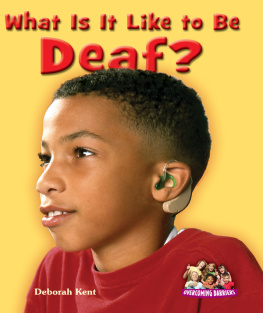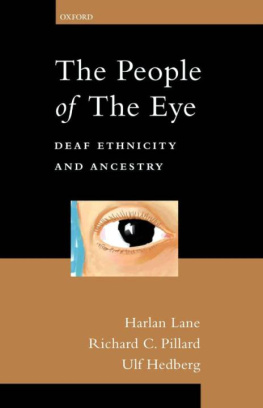Contents
Outcasts and Angels
Outcasts and Angels
The New Anthology of
Deaf Characters in Literature
Edited by Edna Edith Sayers
Gallaudet University Press
Washington, DC
Gallaudet University Press
Washington, DC 20002
http://gupress.gallaudet.edu
2012 by Gallaudet University
All rights reserved. Published 2012
Printed in the United States of America
Library of Congress Cataloging-in-Publication Data
Outcasts and angels : the new anthology of deaf characters in literature / edited by Edna Edith Sayers.
p. cm.
ISBN 978-1-56368-539-2 (hard cover: alk. paper) ISBN 978-1-56368-540-8 (e-book)
1. Deaf in literature. 2. People with disabilities in literature. 3. Characters and characteristics in literature. I. Sayers, Edna Edith.
PN56.5.H35O98 2012
808.8035272dc23
2012022979
Cover photograph of the Magnolia Cemetery, Mobile, Alabama, from the George F. Landegger Collection of Alabama Photographs in Carol M. Highsmiths America, Library of Congress, Prints and Photographs Division. Photograph by Carol M. Highsmith.
Cover design by Dennis Anderson
 The paper used in this publication meets the minimum requirements of American National Standard for Information SciencesPermanence of Paper for Printed Library Materials, ANSI Z39.48-1984.
The paper used in this publication meets the minimum requirements of American National Standard for Information SciencesPermanence of Paper for Printed Library Materials, ANSI Z39.48-1984.
For Will Sayers
Contents
Daniel Defoe
England, 1729 | From The Life and Adventures
of Mr. Duncan Campbell |
Charlotte Elizabeth
England, 1841 | From Letter VIII: The Dumb Boy,
in Personal Recollections |
Henry William Bishop
USA, 1868 |
Auguste Villiers de LIsle-Adam
France, 1883 |
Ambrose Bierce
USA, 1891 |
Annie Trumbull Slosson
USA, 1896 |
Richard Dehan
England, 1915 | Under the Electrics: A Show-Lady
Is Eloquent |
Viola Meynell
England, 1924 |
Gianna Manzini
Italy, 1929 |
Howard T. Hofsteater
USA, 1930 |
Kim Tongni
Korea, 1936 |
Isak Dinesen
Denmark, 1937 |
Juozas Gruas
Lithuania, 1937 |
Weldon Kees
USA, 1939 |
George P. Elliott
USA, 1954 |
Flannery OConnor
USA, 1955 |
Gordon Woodward
Canada, 1955 |
Nadine Gordimer
Republic of South Africa, 1956 |
Warren Kliewer
USA, 1964 |
Joanne Greenberg
USA, 1967 |
Rasheed A. Gbadamosi
Nigeria, 1969 |
Joanne Greenberg
USA, 1985 |
Douglas Bullard
USA, 1986 |
Richard Umans
USA, 1986 |
Carole Glickfeld
USA, 1989 |
Sheila Kohler
USA/Republic
of South Africa, 1990 |
Pauline Melville
England/Guyana, 1990 |
| Florence V. Mayberry USA, 1992 |
Karawynn Long
USA, 1995 |
Morris Smith
USA, 1997 |
Marlin Barton
USA, 2009 |
Julian Barnes
England, 2009 |
Introduction
In the 1970s, when the academic discipline of womens studies was in its infancy, the investigation of female literary characters in novels and stories by authors of either sex was already giving way to the study of work by women writers. In Deaf studies, the focus on deaf characters in literature began to give way to the study of deaf writers in the 1990s. Disciplines devoted to the study of historically silenced groups evolve, and that is as it should be. Yet the study of literary characters still has a great deal to tell us about how such groups were seen within any given society because writers both reflect public views and contribute to shaping them. In fact, most Americans today will encounter a deaf person only in fiction, film, or television drama, not in real life.
An extremely well-read hearing friend told me he knew of only one deaf character in literature: Joel Mayes in Eudora Weltys First Love, a 1942 story about a deaf boy who witnesses Aaron Burr making history. It is not a far-fetched guess that many teachers of literature could not even come up with that one title. Deaf characters are in fact rare, and for two very good reasons. One is that deaf people are rare in real life. In the United States, for example, about one-tenth of one percent of the population is born deaf, not much more than a quarter million souls. Even when one adds to that statistic people who became deaf as children, the numbers are small, and considering how signing deaf people tend to congregate (for example, in Rochester, New York, or Silver Spring, Maryland), even these small numbers are not to be encountered in every community today. The second reason has to do with how literature worksstories are told in dialogue between characters. With the rare exception of stories that have only one human character and must be told through the characters thoughts, a storys plot develops when characters interact with one another in language. This means that characters have to share a language, a seemingly obvious point that seems not to have occurred to some writers who have embarked on stories with a deaf character. However, Wilkie Collins, creator of the deaf heroine Madonna in his novel Hide and Seek , understood the problem in 1854:
I do not know that any attempt has yet been made in English fiction to draw the character of a Deaf-Mute, simply and exactly after natureor, in other words, to exhibit the peculiar effects produced by the loss of the senses of hearing and speaking. The famous Fenella in [Walter] Scotts Peveril of the Peak, only assumes deafness and dumbness; and the whole family of dumb people on the stage have the remarkable facultyso far as my experience goesof always being able to hear what is said to them.
We still see deaf characters with this remarkable faculty more than 150 years later.
Given the technical challenges of creating a deaf character who really cannot hear, why bother? Writing in 1890 of Collinss Madonna, the literary critic and folklorist Andrew Lang claimed that if this character had been hearing, the story need not have been altered in the least because it is her status as an orphan and as the unknown and unknowing sister of the man she loves that drives the plot. Lang faults Collins for failing to make her deafness and dumbness lead to anything and supposes that it merely gave Collins a chance of studying the life of a beautiful mute. but each reader ultimately is her own judge of that.
To be clear, I agree with Lang that the plot of Hide and Seek would not have to be changed at all if Madonna had been hearing. To me, however, that is a good thing. If the interest of a story resides wholly in the fact that the main character is deaf (or Jewish, or gay, or what have you), then that character will fail to interest readers on any other level, and the story is less likely to be great literature that examines the human condition. Paul Robinson illustrates this point with the example of peg-legged Captain Ahab in Moby Dick : If Ahabs obsession with the white whale were caused by Moby Dick having killed his son instead of having taken his leg, the plot would not be changed at all. This demonstrates that Moby Dick is about revenge, megalomania, and the quest for transcendence, not about life as an amputee. Readers of Boyle, both deaf and hearing, are apt to complain that his heroine does not act deaf enough (though hearing readers mean quite different things by this phrase than deaf readers) even though Boyle has done a tremendous job showing his heroines typically troubled relationship with her hearing mother, her resistance to undergoing cochlear implant surgery, her marginalization among her boyfriends hearing friends, and even her pride in her lipreading skills, which is actually quite common among real deaf people today. Readers of Itani, in contrast, are likely to claim, as McDonald has, that her heroine is nothing but deaf. Everyones a critic.

